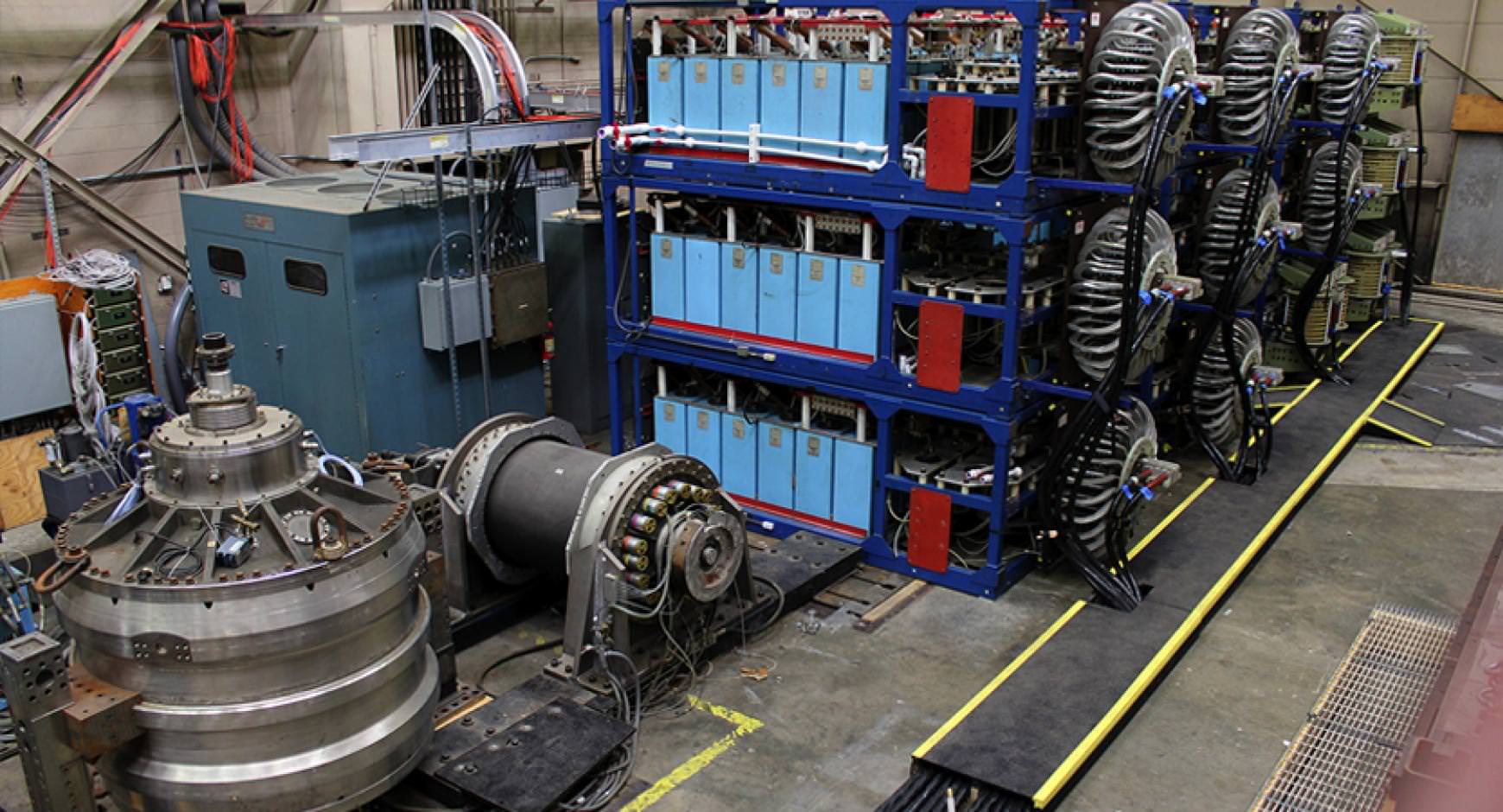Future of Energy
Global Energy, Starts in Texas
The energy landscape has entered a period of transformation, driven by increased demand, rapid technology development and the global push to achieve net-zero emissions. Texas is one of the most energy resource-rich states in the country and is uniquely positioned to lead the innovation underpinning next-generation energy solutions. With nearly a century of leadership in the field — from roots in oil and gas to breakthroughs in batteries and new sources of power — the breadth of expertise in the Cockrell School of Engineering is unmatched in this area. The future of energy starts here.
Interested in:
Batteries and Energy Storage | Efficient and Responsible Use of Oil and Gas | Hydrogen | Electric Grid | Solar, Geothermal and Other Renewable Power | Emissions Modeling, Measurement and Mitigation | Smart Building and Infrastructure | Carbon Capture, Storage and Utilization | Sustainable Processes and Materials | Nuclear Energy | Energy Integration and Decision Making | Updates
U.S. Department of Energy funded research in the last four years ($145 million university-wide)
Energy startup companies active via Texas Innovation Center this year
Industry partners working with us on energy research and projects
Square feet of interdisciplinary space in the new Gary L. Thomas Energy Engineering Building
Energy centers and organizations at UT
Energy-focused degrees, minors and certificate programs for engineering students
Join Us in Solving the World’s Energy Challenges
Cockrell is seeking partners to help identify problems, invest in ideas and implement economically viable solutions. Connect with the Cockrell School Industry & Research Relations Office to learn more about partnership opportunities.

Leading the way

Batteries and Energy Storage
With a foundation that dates back to Nobel Prize-winning battery pioneer John Goodenough’s arrival at UT Austin in the 1980s, Cockrell is addressing every aspect of battery innovation, aiming to enhance life cycle and safety, develop new materials, create storage solutions and reduce cost and charging time. From computational modeling of battery mechanics and chemistry at the atomistic level to manufacturing EV-sized batteries and everything in between, Cockrell has the know-how and capabilities to continue a tradition of pioneering research.
Efficient and Responsible Use of Oil and Gas
The University of Texas at Austin’s leadership in oil and gas research and innovation dates back nearly a century. It continues to build upon that foundation to develop better, more efficient and cleaner oil and gas solutions. The Hildebrand Department of Petroleum and Geosystems Engineering is the No. 1 ranked petroleum engineering department in the nation by U.S. News and World Report, complemented by top-ranked programs in environmental and the McKetta Department of Chemical Engineering as well. Researchers are investigating ways to produce safe, cleaner and more reliable energy from oil and gas for years to come. And the same technologies and skillsets that made Texas a leader in oil and gas innovation will play an important role in the continued development of alternative fuel sources to advance the goal of net-zero emissions.
Center for Subsurface Energy and the Environment


Hydrogen
Cockrell has a history of leadership in advancing the hydrogen economy, from deploying Texas’ first hydrogen-powered bus on the road, to developing new materials to produce hydrogen from sunlight and water, to constructing hydrogen research facilities that represent the end-to-end value chain for hydrogen. Investigators are researching ways to make, store, transport and use hydrogen as a safe, efficient, cost effective and zero-carbon energy source.
UT’s H2@Scale Department of Energy Project
Electric Grid
Power grids must continue to evolve to meet increased resiliency, electricity demand, reliability and security challenges, among other key drivers of change. UT Austin is at the forefront of this effort, partnering with national labs and using the campus microgrid and test microgrid at the Center for Electromechanics to prove out new solutions. UT Austin is addressing power source integration, delivery, stability and vulnerability through modeling and demonstration programs. Research groups in the Chandra Family Department of Electrical and Computer Engineering are investigating future grid solutions, including power electronics and grid architecture for improved resilience.
Center for Electromechanics – Grid Solutions
Power Electronics & Magnetics Lab
Electrified Processes for Industry Without Carbon – EPIXC


Solar, Geothermal and Other Renewable Power
Supported by a National Science Foundation solar power research center, Texas Engineers are developing new energy technologies and alternative resources that improve our energy system worldwide. Faculty are investigating several topics related to wind energy, including thunderstorm impacts on wind turbines and development of offshore windfarms in the Gulf of Mexico. Leveraging our roots and expertise in oil and gas drilling and completions, we are exploring new frontiers in geothermal energy and finding the best ways to harvest and utilize it.
Center for a Solar-Powered Future
Geothermal Entrepreneurship Organization
Participation in DOE’s Frontier Observatory Research in Geothermal Energy (FORGE) Initiative
Emissions Modeling, Measurement and Mitigation
The Cockrell School is home to leading experts in emissions modeling, measurement and mitigation in various, including methane emissions and abatement of unwanted combustion by-products.
Project ASTRA Network of Sensors to Monitor Emissions
Energy Emissions Modeling and Data Lab
Professional Development Course on Methane Emissions in the Natural Gas Supply Chain


Smart Building and Infrastructure
Building energy use accounts for a significant portion of overall energy consumption. Researchers are studying how to best integrate building and infrastructure systems to make them more energy efficient and bidirectional in the ability to demand and supply power to the grid. Next-generation technologies like artificial intelligence have the potential to serve as a backbone for improved energy usage in our built environment.
Carbon Capture, Storage and Utilization
Cockrell is working on solutions to the technical and economic challenges facing carbon capture, storage and utilization by developing new technologies and methods, while partnering with industry to address important needs. Researchers are helping identify subsurface locations and formations that make the most sense to store carbon-dioxide from the Gulf of Mexico to the Permian basin and beyond, and also performing pioneering research such as the storage of carbon dioxide in hydrate state.
Carbon UT – Center for Subsurface Energy and the Environment


Sustainable Processes and Materials
Looking at the entire energy spectrum means addressing the processes and methodology through which we are producing, storing, delivering and recycling energy producing materials, as well as rethinking the materials we are using throughout the energy mix and their lifecycles.
Center for Materials for Water and Energy Systems
Nuclear Energy
Nuclear reactor designs have changed in recent years to focus on smaller, safer, modular solutions that aim to better address spent fuel disposal. Nuclear energy will continue to play a significant role in meeting the world’s increased demand for climate-friendly energy. UT Austin has a strong history in nuclear engineering and remains at the technological forefront. UT Austin’s Nuclear Engineering Teaching Lab is home to a TRIGA Mark II reactor, one of the newest in the fleet of U.S. university teaching reactors. And it is home to a number of collaborative research endeavors including, the development of a molten salt reactor.
Nuclear and Radiation Engineering Program


Energy Integration and Decision Making
As the future of energy evolves, properly integrating renewables, clean fossil fuel sources and nuclear with the grid while leveraging leading-edge technologies such as AI and machine learning presents challenges and decision points. The Walker Department of Mechanical Engineering’s Operations Research and Industrial Engineering group focuses on advanced methods, technologies, and techniques to help integrate energy system components and analyze the tradeoffs and technology of the future of energy.
Operations Research and Industrial Engineering
Center for Engineering and Decision Analytics
Collaborations
The Cockrell School is building the future of the U.S. semiconductor economy with teams across the Forty Acres and beyond. Below are just a few of our collaborators:
The Energy Institute
Jackson School of Geosciences
College of Natural Sciences
McCombs School of Business
Kay Bailey Hutchison Energy Center
LBJ School of Public Affairs
School of Architecture
Texas Advanced Computing Center
Environmental Science Institute

